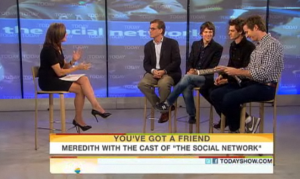 On NBC’s Today, Meredith Vieira interviewed stars and the writer of The Social Network as part of the movie’s store release today. When asked about Mark Zuckerburg’s reaction to the motivation being inaccurate, writer Aaron Sorkin said, “If a movie absolutely had to be made, I would want it told only from my point of view and not also including the points of view of the people who were suing me and hated me. And this movie is told from everybody’s point of view.” Matt Lauer also had Nicole “Snooki” Polizzi talking about her novel today, a book apparently prompting discussion of Snooki’s capacity to write. She may have a party girl image, but what I saw was a young woman who probably has more potential than we’re giving her credit.
On NBC’s Today, Meredith Vieira interviewed stars and the writer of The Social Network as part of the movie’s store release today. When asked about Mark Zuckerburg’s reaction to the motivation being inaccurate, writer Aaron Sorkin said, “If a movie absolutely had to be made, I would want it told only from my point of view and not also including the points of view of the people who were suing me and hated me. And this movie is told from everybody’s point of view.” Matt Lauer also had Nicole “Snooki” Polizzi talking about her novel today, a book apparently prompting discussion of Snooki’s capacity to write. She may have a party girl image, but what I saw was a young woman who probably has more potential than we’re giving her credit.
Visit msnbc.com for breaking news, world news, and news about the economy
Both interviews got me thinking about the information we make available about ourselves, thus forming the perceptions others have about us.
You may always want to be viewed in the best light, so you limit the opportunities for others to see you any other way. Bloggers truly understand this because our readers can form an opinion of us heavily influenced by what we’re allowing to be made public on the web. There are entire industries devoted to public image, all based in the idea we must control this information. Dan Schawbel has made Personal Branding a must-have for Gen Y.
When the public sees a lesser version, we often become upset. “That’s not me.” As Sorkin said, while we may not want to see it ourselves, we can be quite different than who we present to the world.
Sometimes we’re not looking for people to see the best version of ourselves, but instead they see an extreme trait personified in our perceived behavior. People may think Snooki is throwing away her own dignity, but she could also be a genius at Personal Branding. Do we really know? Most of us can only draw conclusions from the version of Snooki that she has provided for us, which is pretty different from the woman who spoke with Matt today.
There is a lot more to us than the single dimension provided by a blog design or manifesto, by reality TV or a scripted press release. We who may try to control our public image must remember that at some point we lose that luxury of control. We see it all the time with celebrities: stories come out of the woodwork from childhood friends, distant family, or former lovers. While the degree of truth in some of those stories could be questioned, they provide us with more texture and color to the images presented to us.
This is something to remember: all of us are more than what you see online or in the public eye.
Screenshot taken from the embedded video provided, copyright msnbc.





Excellent post, Emily. You’ve touched on some things I often think about.
When I saw The Social Network, I wanted to see it for the story, not the truth. But then again, I’m not Mark Zuckerberg, so it’s easy for me to feel that way.
As you said, if we’re going to have public images, we have to accept that, at some point, we lose control of those images. And I loved your point about how we perceive ourselves and how others perceive us. I’ve blogged about this, and it’s a truth of life that I feel many people haven’t figured out yet. After all, there are two sides to every story, and two people can see the same person in completely different ways.
I don’t really have the expertise to talk about Snooki. I’ve never watched Jersey Shore and all I know is that she got in trouble with the law (DWI, maybe?), but she seems to have a party girl reputation. If we’re discussing branding, couldn’t you say that our reluctance to take her seriously is due to how she’s previously branded herself? And couldn’t you also argue that trying to be a serious fiction writer might contract her previous brand? Maybe she’s trying to make a new brand for herself, but she has to expect bumps such as this.
Hi Jake, thanks for your own perspective. The Snooki thing is an interesting conversation because she could be a great brand down the line, but will we ever forget how she got there? Who knows, and does the how matter as much anymore? To some of us it does, to others the end justifies the means.
I may over-think how people perceive me myself. I don’t question everything I say, but sometimes I’ll pause and think, how else could someone interpret what I just said? I think it helps me be a bit more aware that people don’t always hear or see things the same way we may have said or written them. It goes beyond context, too, because a person brings their own manner of thinking to the table.
I don’t believe that all press is good press, I think you can have bad press. What I think has changed is that you don’t get to always have the only say, so there is more than one press.
Thanks Jake!